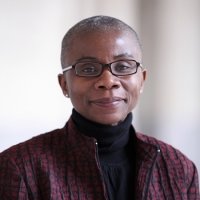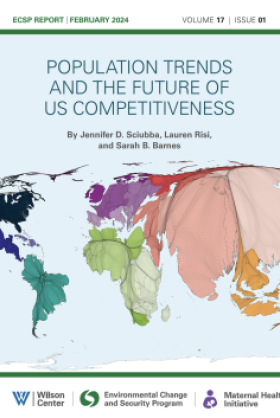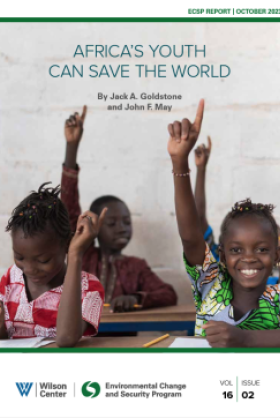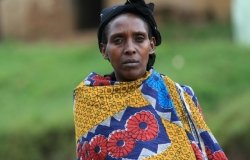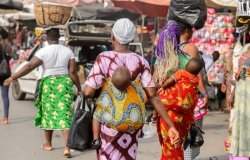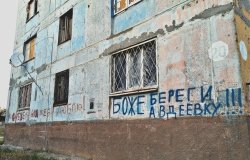Managing Nigeria’s Diversity Amidst Rising Ethno-religious Tensions: A Conversation with H.E. Olusegun Obasanjo, former President of the Federal Republic of Nigeria
Overview
On October 15, 2019, the Wilson Center Africa Program hosted Managing Nigeria’s Diversity Amidst Rising Ethno-religious Tensions: A Conversation with H.E. Olusegun Obasanjo, former President of the Federal Republic of Nigeria. The Honorable Frank R. Wolf, former member of the House of Representatives (R-VA) gave introductory remarks and joined H.E. President Olusegun Obasanjo for this address. Dr. Monde Muyangwa, Africa Program Director, moderated the event.
President Obasanjo, who as a military ruler shepherded Nigeria back to democratic civilian rule in 1979 and who also served as Nigeria’s President from 1999-2007, shared his reflections on the challenges and opportunities of diversity in Nigeria, and ways in which the country can better address and manage this diversity to mitigate ethno-religious tensions and build a stronger, more inclusive Nigeria. President Obasanjo’s visit to the Wilson Center was made possible by the International Committee on Nigeria.
Congressman Wolf’s opening remarks gave a sobering perspective of the multi-faceted and dynamic challenges facing Nigeria, particularly in light of the conflict involving Boko Haram and conflict in the Middle Belt of the country between previously peaceful groups. The fact that Boko Haram is one of the deadliest terrorist groups in the world warrants great global attention. He noted the importance of Nigeria both in Africa, as well as globally. Recalling Senator John Danforth’s successful role as Special Envoy to the Sudan, Congressman Wolf called for more U.S. support for the region, including the appointment of a U.S. Special Envoy for Nigeria and the Lake Chad Region to coordinate the U.S. government response to all aspects of the crisis across different agencies and among allies.
President Obasanjo’s remarks located diversity and its management as a foundational issue to the challenges facing Nigeria. Diversity, he emphasized, is a positive for society and should be cherished and guarded. The problem comes with the mismanagement of a country’s diversity by its leadership through lack of understanding or appreciation, weak governance, or lack of knowledge on how to effectively manage diversity. The risks of this mismanagement include division, conflict, or secessionist movements.
The President then contemplated the way forward for Nigeria, calling for improving the quality of leadership and enhancing democratic and inclusive governance. He noted that leaders should be educated, knowledgeable of their citizenry, competent, and nationalistic. Governance must be democratic and focused on nation-building. Democracy needs to be participatory at all levels—politically, economically, and socially. Critically, he stated that society must be made inclusive and viewed as a whole, not just as a sum of its parts. The President called on Nigerians at all levels and from all walks of life to lead the way in securing their own future through managing diversity and inclusive economic growth and development. He noted that Nigeria’s friends and partners can only add value to Nigerians’ own efforts. To this end, he thanked Congressman Wolf and Nigeria’s many friends in the international community for their continued support. He also underscored the importance of Nigeria’s relationships with countries such as the United States.
Selected Quotes
Congressman Frank Wolf, Former Representative, Virginia's 10th Congressional District, United States House of Representatives
“America should always speak out and take action against genocide, against crimes against crimes against humanity. We must not forget history, when the world and the United States ignored the genocide in Rwanda, hundreds of thousands of people died. I can still remember. The cables were coming into the State Department, cables were coming into the UN, and the world ignored what was taking place.”
“It said, ‘So goes Nigeria, so goes all of Africa.’ It is clear that the crisis plaguing Nigeria is multifaceted, but one that must be addressed by the Nigerian government and the U.S. government and the international community. Because this is a problem that affects the countries surrounding Nigeria, as well. I believe that we need a special envoy for Nigeria and the Lake Chad region who can coordinate the response to the crisis by various agencies of our government, and who can work with allies in France and England and other countries on terrorism, hunger, sexual trafficking, corruption, religious freedom, human rights violations education—all of the different aspects.”
H.E. Olusegun Obasanjo, Former President, Federal Republic of Nigeria
“When people ask me, ‘What are your worst fears about Africa,’ I never hesitate to mention two issues: management or mismanagement of diversity and management or mismanagement of population, particularly the youth bulge. The third one that is rearing its ugly head is credibility of elections and the effect of that on democracy and governance.”
“If we are able to manage diversity successfully through good governance and good leadership, we will, by extension, manage population and electoral process is also likely to be well-managed to give free, fair, credible, and generally acceptable election results. Diversity by itself is no problem."
“The question now is, ‘Who will save Nigeria; make it secure with well-managed diversity, fast-growing economy for some social order, satisfactory development, and improved living standard for all citizens?’ The answer to me is simple and straightforward: it’s the Nigerians. And here, I want to commend the Nigerians at home and in the diaspora.”
Hosted By

Africa Program
The Africa Program works to address the most critical issues facing Africa and US-Africa relations, build mutually beneficial US-Africa relations, and enhance knowledge and understanding about Africa in the United States. The Program achieves its mission through in-depth research and analyses, public discussion, working groups, and briefings that bring together policymakers, practitioners, and subject matter experts to analyze and offer practical options for tackling key challenges in Africa and in US-Africa relations. Read more
Thank you for your interest in this event. Please send any feedback or questions to our Events staff.
